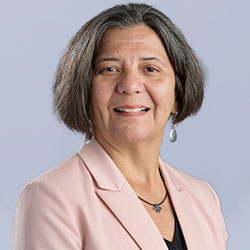California is the most diverse place on earth. You see that diversity in our people, our culture, and our landscape. Our differences are our strength — but only if we remember the things that bind us together and the values we all share.
The belief that everyone should have health care is one of those universal values. From the day we are born, health care gives people the opportunity to have full lives and the vitality to pursue their dreams. And no one should lack support when illness strikes.
Over the last year, the California Health Care Foundation (CHCF) has been re-examining the work we do, because we want to make sure our efforts and our dollars are making the greatest possible impact in light of what’s happening in the world around us. As we went through that process, one unavoidable truth remained as our top concern: Too many Californians with low incomes are held back or suffer because it is too hard to get the care they need. Our board of directors and CHCF’s deeply committed staff have decided that the foundation’s top priority should be to address that problem.
Certainly, this undertaking will not be easy, but the good news is that there are clear ways to make health care work for Californians with low incomes. Here are three that are top of mind for us now.
1. All Californians Should Have Health Coverage
California has made huge gains in recent years under the Affordable Care Act (ACA). We’ve cut our number of uninsured by half. Now we must finish the job and work to ensure everyone has health benefits.
Achieving universal coverage would level the playing field in two key ways. It would allow all Californians to meet basic needs for care, and it would protect all Californians financially from extraordinary health care expenses. Today, three million of our friends and neighbors remain uninsured. Most have jobs and are contributing to our economy and communities, but those jobs do not include health insurance. We must also remember that one in three uninsured Californians is an undocumented immigrant. These people are part of the fabric of California’s society; if we allow them to remain vulnerable, all of California will pay the price.
Never has California been so close to achieving universal coverage. There is no one pathway to get to that goal, but get there we must.
2. Coverage Must Lead to Better Care
Coverage is not an end in itself — it’s really just the gateway to better health. To deliver on this promise, coverage must lead to better care. Our biggest opportunity to improve care for Californians with low incomes is to make sure that California’s approach to coverage for populations with low incomes — the Medi-Cal program — delivers high-value care. The program covers one in three Californians. And two-thirds of Californians say Medi-Cal is important to them and their families. When we get Medi-Cal right, the impact is broad and deep because of the program’s overall reach and the profound ways in which it improves a person’s prospects for health.
In the last year, we have seen major new federal threats to Medicaid’s fiscal and policy stability. Given the importance of Medi-Cal to California, we must continue working together locally and with other states to protect Medicaid from ill-advised budget and policy changes.
But it isn’t enough for California to protect the status quo. There is so much potential for improvement in Medi-Cal, which serves Californians with the greatest health burdens. We must be diligent and vigilant in finding new ways to reduce the struggle of those who depend on the program and to give them opportunities to live healthy lives. We can and should make the system easier to navigate and care easier to access. We must modernize the state’s health workforce to make treatment more effective and more cost-effective. And we can and should expect innovation in Medi-Cal to keep pace with the evolution of care in the private sector.
3. Stop Treating Conditions and Start Treating People
Our health care safety net still is organized around the outdated assumption that one person’s body and mind require two or more separate systems of care. Today we know that physical health and mental health are inextricably bound together. It is past time to update our health care system to reflect that understanding.
It is especially important that we better integrate care for Californians with low incomes who experience mental illness, drug or alcohol addiction, or other complex health conditions. Even though they comprise a relatively small share of the population, they account for half of health care spending. Siloed systems of care cause needless and profound suffering.
Health care leaders and providers across California have been working harder than ever to address this problem. Innovations in policy, like Medi-Cal’s Whole Person Care and Drug Medi-Cal pilots, are giving communities new opportunities to integrate care. Technology innovations can help providers extend those opportunities to larger and larger numbers of people.
Solutions Are Out There. It’s Time to Put Them to Work Everywhere.
California has the power to accomplish each of these goals. We boast the world’s sixth largest economy. California is rich in health care and innovation talent. But even with those advantages, we cannot succeed without working together across sectors, across professions, and across ideological camps.
Health care is a universal value. It will take a universal effort to make sure all Californians can meet their basic need for care.
Authors & Contributors




